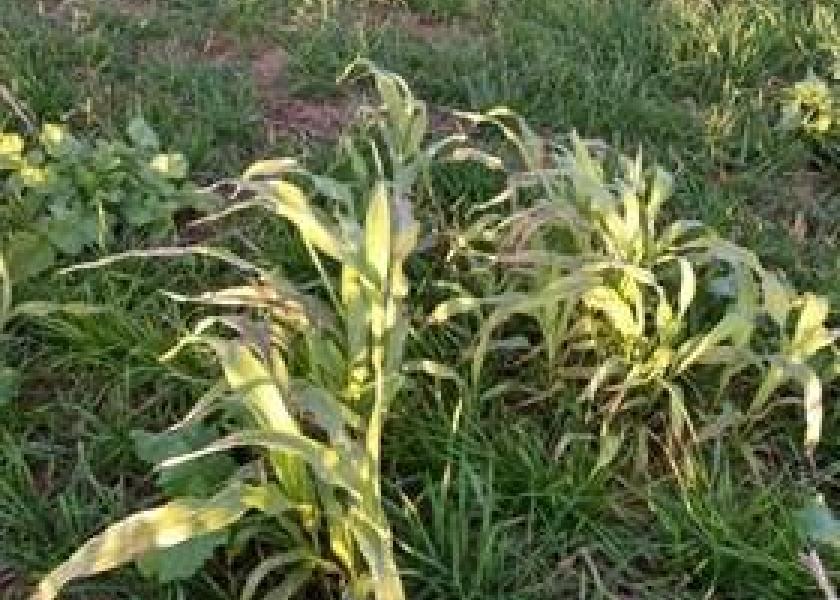Prussic Acid in Warm Season Annuals

Many of producers in Oklahoma are growing summer annual forage crops such as forage sorghums or sudangrass (or their hybrid sorghum x sudangrass) or have johnsongrass in pastures. Several producers are using these forages as a fall stockpile forage for cows or weaned calves. Other producers that planted small grains directly into the standing cover crops or crop residues have seen volunteer corn, sorghum, or sudan come up in the planted wheat.
The average frost date for most of central and northern Oklahoma is upon us, and prussic acid will be (or already is) an issue in certain forages commonly found in fields and pastures.
Prussic acid is found when susceptible plants are under drought conditions or after a light frost.
Prussic acid is a form of cyanide and will absorb through the rumen wall and reach the blood stream. When prussic acid combines with hemoglobin in the red blood cells, the cells will take up oxygen but will not be able to release it. This causes suffocation. The oxygen saturation in the red blood cells causes the blood to have a bright cherry red color. The symptoms of prussic acid poisoning are similar to the symptoms of nitrate poisoning, but in nitrate poisoning the red blood cells cannot take up oxygen, causing blood to be a dark chocolate brown color. The symptoms include: anxiety, weakness, labored breathing, and death. Many times the first symptom observed by producers is dead animals.
The plants that have the most issues with prussic acid poisoning are (in order of susceptibility) grain sorghum (most), johnsongrass, corn, sorghum-sudan hybrids, and finally pure sudangrasses. Millets (such as pearl millet) do not produce prussic acid, but are nitrate accumulators.
Prussic acid is higher in younger plants than older plants, higher in leaves than stems, and higher in upper leaves than lower leaves. This means the volunteer in the newly planted small grain fields are likely to have the highest levels.
What to do…
- Do not allow animals to graze fields until plants reach 18 to 24 inches.
- Do not graze drought damaged plants until 4 days following a good rain.
- Do not graze frost damaged plants during the first 7 days following a frost or until plants are completely dried out and brown in color.
- Frost damaged plants that are not killed by the frost can be grazed within 4 days if they are greater than 30 inches tall.
- Frost damaged plants that are not killed by the frost and are < 30 inches tall should have cattle kept off for 10 to 14 days
Prussic acid can be an issue every year. But with knowledge and management it is something that we can work around with no impact on animal health or performance.
For more information on prussic acid poisoning look at the OSU Extension Fact Sheet:PSS-2904 Prussic Acid Poisoning at Prussic Acid Poisoning | Oklahoma State University (okstate.edu)
See a classic episode of SunUp TV Cow-Calf Corner where Dr Glenn Selk talks about prussic acid poisoning in johnsongrass. Cow-Calf Corner 9/28/13 — SUNUP TV (okstate.edu)







